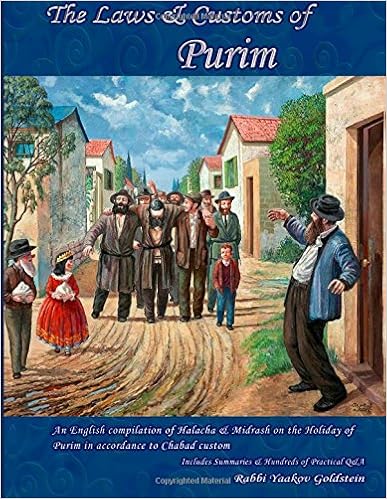
This article is an excerpt from our Sefer

Buy me on Amazon.com
Haman’s appointed the task of parading Mordechai: [1]
That night Haman walked into the kings courters to ask his permission to hang Mordechai. The king asked Haman what the king should do to the person he desires to honor? Due to Haman’s great ego, he thought the king was referring to him, and he answered that the person should be paraded in the king’s royal garments and royal horse throughout the streets of Shushan. The king then ordered Haman to perform all these honors to Mordechai the Jew. Haman followed these exact instructions and shamefully paraded Mordechai throughout the streets of Shushan, proclaiming “Such shall be done to whom the king wishes to honor”.
Q&A
How did the king react when he heard Haman approaching in the courtyard?[2]
The king had dreamt that Haman was approaching him with a sword to kill him. He woke up in a panic and asked for his chronicles to be brought before him. When he heard Haman approaching he said “Yes it is true, now he is coming to kill me”.
Haman is asked to honor Mordechai:[3]
When Haman was asked the question of “What shall be done to the person who the king wishes to honor” he thought the king was referring to him and therefore he answered as above. The king then asked him “Go do exactly as you say to Mordechai.” Haman replied “Which Mordechai”. The king replied “the Jew”. Haman asked “there are many Jews named Mordechai”. The king replied “the Jew that sits in front of the kings gates” Haman answered “It would suffice to reward him with giving him a town or appointing him as a tax collector”. The king replied “I will do that as well, do not refrain from fulfilling any of the matters that you previously mentioned”.
Was the intent of Achashveirosh to honor Mordechai truly virtues?
Some Mefarshim[4] explain that the king intended on rewarding Mordechai right away, and in the above manner, in order so Mordechai does not later request from him to save the Jews as reward.
Haman approaches Mordechai and prepares him for the royal ride:[5]
When Mordechai saw Haman approaching him with the clothing and horse, he became very frightened and was certain that Haman had come to kill him. He told his pupils to scatter, lest they also get hurt. They told Mordechai “We will stand in prayer and die in the midst of prayer”. They sat down and began learning the laws of the Omer, as that day was the 16th of Nissan. Haman asked them what they were learning and they replied “The laws of the Omer”. Haman replied “Your ten Mana worth of the Omer sacrifice has nullified my 10,000 silver coins”. Mordechai replied “Rasha, a slave that owns property to whom does it belong?”.[6] When they finished praying Haman asked Mordechai to wear the clothing of the king. Mordechai refused stating that it is a belittlement to the king to wear his clothing without bathing beforehand. Haman went out to search for a bathhouse but they were all closed, as Esther had sent messengers to close all the bathhouses in the city. Haman had to bathe him himself. Haman desired to place the crown over his head. Mordechai replied “It is a belittlement of the king to have me wear a crown without getting a haircut”. Haman went on to search for a barber shop but they were all closed, as Esther had sent messengers to close all the barber shops. He thus went home and took a pair of scissors and gave Mordechai a haircut. Haman moaned in pain. Mordechai asked him “Why are you moaning”? He replied “a person of my stature now has to resort to become a barber?” Mordechai replied “Weren’t you the barber of the town of Kartzum for 22 years [this is your trade of profession]”. He told Mordechai go onto the horse. Mordechai replied “I am too weak from fasting to step on to it”. So Haman bent over and acted as a stepping stool for Mordechai to climb onto the horse. When Mordechai stepped on Haman he gave him a nice kick. Haman chastised Mordechai saying “Doesn’t your Torah state that when your enemy falls thou shall not rejoice”? Mordechai replied that the verse refers to a Jew that is an enemy, however by you there is another verse that states specifically “to step over him”. The Midrash[7] writes that Haman proclaimed “Yesterday I was busy preparing your gallows and Hashem was busy preparing your crown and royal garments”.
Haman parades Mordechai and is given the sewage of the Haman family:[8]
Haman paraded Mordechai throughout the city. When Haman passed the street of his house his daughter looked out the window to see the source of the commotion and mistakenly thought that her father was being led on a horse by Mordechai. In her great hatred for Mordechai she proceeded to remove the sewage bucket from the bathroom of her home and pour it on top of the person leading the rider, who she thought was Mordechai. Lo and behold, upon noticing her mistake that she dumped her family’s sewage on her own father’s head, she fell out of the window and met her demise. The Midrash[9] states that she committed suicide and purposely threw herself out of the window. Haman returned home smelling with filth and in mourning for his daughter’s sudden death.
The Psalm of “Mizmor Shir Chanukas Habayis Ledavid”:
The Midrash[10] states that at the time of the parade Mordechai, Haman, Esther and Hashem each recited a different verse of Tehillim 30. Mordechai recited “Aromimcha Hashem Ki Dilisaniy Velo Simachta Oyvay Li”. Haman recited “Ani Amarti Beshlavi Baal Emot Leolam”. Esther recited “Alecha Hashem Ekra, Viel Hashem Eschanan”. Hashem recited “Leman Yizamercha Kavod Velo Yidom”.


Leave A Comment?
You must be logged in to post a comment.